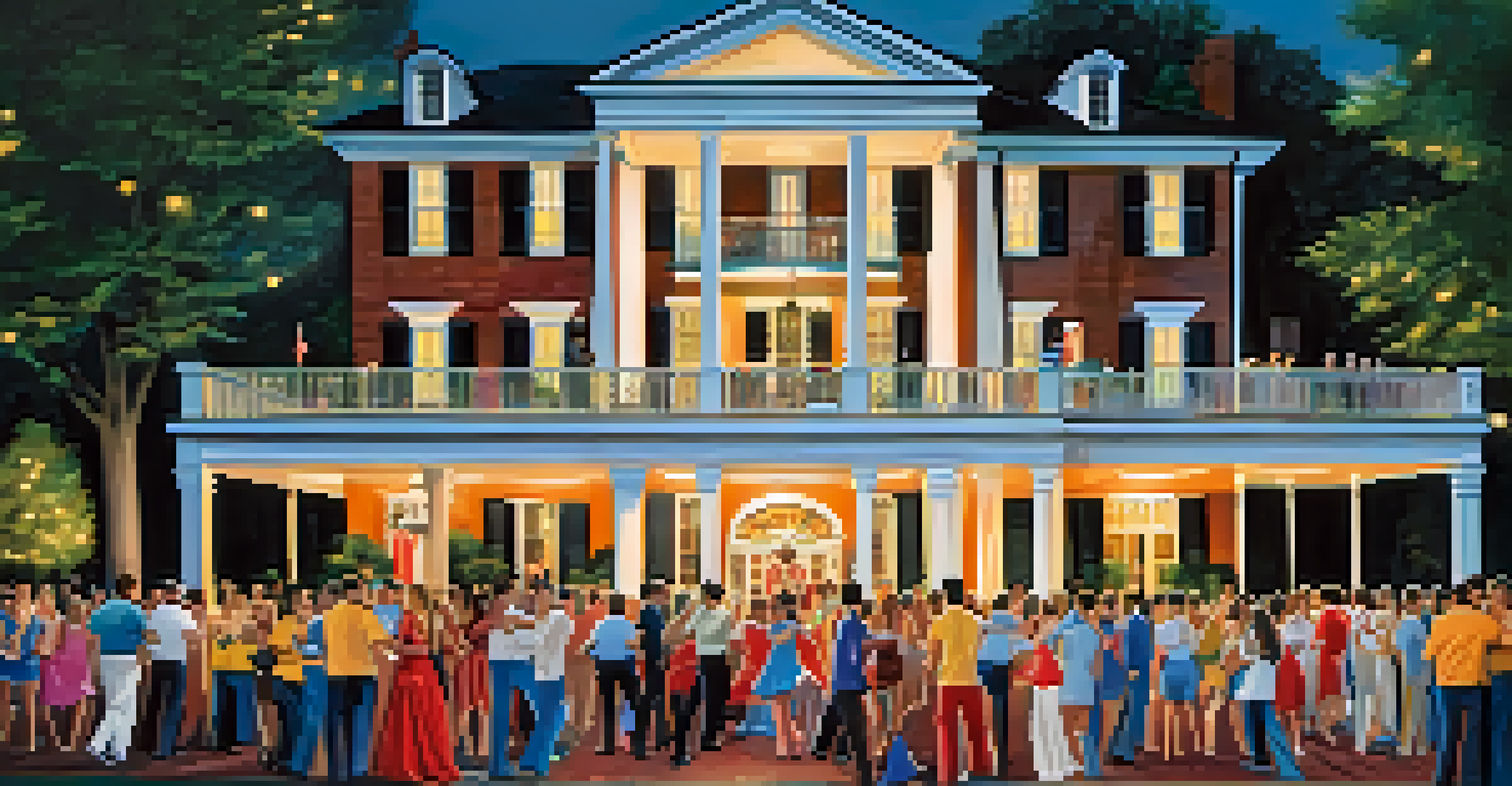The Evolution of Graceland: From Home to Tourist Attraction

Graceland's Origins: The Early Years of Elvis' Home
Graceland was purchased by Elvis Presley in 1957 as a serene escape from his rising fame. Nestled in Memphis, Tennessee, this 13.8-acre estate quickly became more than just a residence; it was a sanctuary for the King of Rock and Roll. The mansion itself, with its distinctive Colonial Revival architecture, reflected Elvis's unique taste and lifestyle.
Elvis is not just a name; he is a tradition, a legacy that continues to inspire generations.
Initially, Graceland served as a personal haven where Elvis could enjoy his family life away from the public eye. The grounds featured beautiful gardens, a swimming pool, and even a racquetball court, showcasing the luxuries that came with his success. As Elvis's popularity soared, so did the significance of his home, setting the stage for its future.
Over the years, Graceland became a gathering place for friends and family, with countless memories woven into its walls. It wasn't just a place to live; it was a symbol of Elvis's achievements and dreams. Little did anyone know that this beloved home would soon welcome fans from around the globe.
The Transformation: Opening Graceland to the Public
Following Elvis's untimely death in 1977, Graceland underwent a significant transformation. The mansion, once a private residence, opened its doors to the public in 1982, allowing fans to step inside the world of their idol. This bold move marked the beginning of Graceland's journey as a tourist attraction and a shrine to Elvis's legacy.

The decision to turn Graceland into a museum was met with both excitement and skepticism. Would fans cherish the experience of walking through the rooms where Elvis lived? The answer was a resounding yes, as thousands flocked to experience the magic of Graceland firsthand. It became a pilgrimage site, offering a glimpse into the life of the man behind the music.
Graceland's Evolution as a Museum
Following Elvis's death, Graceland transformed from a private residence into a public museum, allowing fans to connect with his legacy.
As visitors wandered through the rooms adorned with Elvis memorabilia, they were not just observing a house; they were stepping into history. This transition from home to museum breathed new life into Graceland, setting the stage for its evolution into a cultural landmark.
Graceland's Iconic Status: A Cultural Landmark Emerges
As the years rolled on, Graceland evolved into one of the most visited private homes in America. It attracted fans not only from the United States but from all over the world, solidifying its status as a cultural landmark. The combination of Elvis's music, persona, and the charm of Graceland created an experience that was both nostalgic and celebratory.
Graceland is more than just a home; it’s a pilgrimage site where fans can connect with the spirit of Elvis.
Events such as Elvis Week, held annually in August, further enhanced its cultural significance. Fans come together to celebrate his life and legacy, sharing stories and memories while enjoying live performances. This annual gathering transformed Graceland into a vibrant, living tribute to the King of Rock and Roll.
Graceland's continued popularity is a testament to Elvis’s enduring influence on music and pop culture. Each visitor leaves with a piece of Elvis history, reinforcing the mansion's role as a beacon of his artistic spirit.
The Expansion: New Attractions and Experiences
Recognizing the need to accommodate the growing number of visitors, Graceland expanded its offerings in the years following its opening to the public. New attractions, including the Elvis Presley Car Museum and the Elvis: The Exhibition, provided fans with even more ways to engage with his legacy. These additions showcased Elvis's love for automobiles and offered deeper insights into his life.
The Graceland Archives also became a significant part of the experience, allowing fans to glimpse rare artifacts and memorabilia. From costumes to awards, these exhibits offered a richer understanding of Elvis's impact on music and culture. Each new addition was designed to enhance the visitor experience while preserving the mansion's historical integrity.
Cultural Landmark for Elvis Fans
Graceland has become a significant cultural landmark, attracting visitors from around the world to celebrate Elvis's life and music.
As Graceland continued to evolve, it became more than just a house; it transformed into a multi-dimensional experience. The blend of history and entertainment created a destination that appealed to both die-hard fans and newcomers alike.
Preserving the Legacy: Graceland's Historical Significance
Beyond its status as a tourist attraction, Graceland serves as a crucial site for preserving Elvis's legacy. The mansion has been recognized as a National Historic Landmark, which speaks volumes about its cultural importance. This designation ensures that the history and stories of Elvis Presley are protected for future generations.
The preservation efforts at Graceland are meticulous, focusing on maintaining the authenticity of the mansion while accommodating modern visitors. Each aspect, from the original decor to the gardens, reflects the era in which Elvis lived. This commitment to preservation allows fans to experience the environment that shaped the King himself.
Graceland stands as a physical reminder of Elvis’s extraordinary life and career, inviting exploration and reflection. It embodies the spirit of a man who changed the landscape of music and continues to inspire artists and fans around the world.
The Global Impact: Graceland as a Tourist Destination
Graceland's appeal has transcended borders, making it a global tourist destination. It attracts millions of visitors each year, contributing significantly to the local economy and the tourism industry in Memphis. The impact of Elvis’s legacy is felt not just in music but also in the cultural fabric of the city.
Travelers from various countries come to Graceland to connect with the music that has shaped generations. The experience is often described as spiritual, where fans feel a deep connection to Elvis and his artistry. This global interest highlights the universal nature of his music and the profound influence it has had on people worldwide.
Future of Graceland is Bright
With plans for expansion and new interactive experiences, Graceland is set to remain a vibrant destination for future generations of fans.
As a result, Graceland has become a symbol of not just Elvis Presley, but of rock and roll itself. It represents a shared cultural experience that bridges gaps, bringing together people from different backgrounds who share a love for music and history.
Looking Ahead: The Future of Graceland
As Graceland continues to thrive, its future holds exciting possibilities. Plans for further expansion and revitalization are underway, ensuring that the legacy of Elvis Presley remains vibrant and relevant. New technology and interactive experiences are being integrated to enhance visitor engagement, allowing fans to connect with Elvis in innovative ways.
The ongoing commitment to education and preservation will ensure that Graceland remains a place of learning and inspiration. By hosting workshops, exhibits, and events, Graceland aims to educate visitors about Elvis's impact on music, culture, and society at large. This dedication to sharing knowledge reinforces the importance of preserving history.

Ultimately, Graceland is not just a tribute to the past; it’s a living, breathing entity that continues to grow and evolve. As new generations discover Elvis's music, Graceland will remain a cherished destination for fans, ensuring that the King of Rock and Roll lives on in the hearts of many.